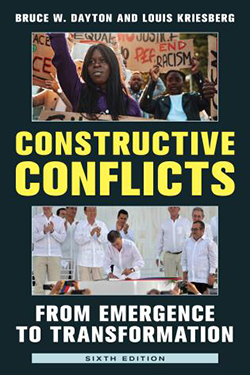Constructive Conflicts: From Emergence to Transformation, Sixth Edition
Louis Kriesberg, Bruce W. Dayton
Rowman & Littlefield, August 2022

Louis Kriesberg, Maxwell Professor Emeritus of Social Conflict Studies and professor emeritus of sociology, and Bruce W. Dayton ’99 Ph.D. (PSc), senior research associate in the Program for the Advancement of Research on Conflict and Collaboration, have published “Constructive Conflicts: From Emergence to Transformation, Sixth Edition” (Rowman and Littlefield Publishers, 2022).
The book explains how large-scale political and social conflicts can be waged more constructively, with more positive consequences and fewer destructive consequences for those involved. Drawing on research from political science, sociology, social-psychology, neuroscience, cultural studies and other disciplines, Kriesberg and Dayton follow the lifecycle of social and political conflicts as they emerge, escalate, de-escalate, become settled, and often emerge again in new forms. The sixth edition presents new examples and cases of conflict episodes that have avoided extreme coercion or violence.
The book gives an interdisciplinary analytical framework for understanding and constructively intervening in conflicts of different type and scale, offering a way out of the destructive cycles of conflict management which have come to characterize contemporary social and political relations.
The first edition of “Constructive Conflicts” was published in 2009 with Kriesberg as the sole author. Dayton joined him as second author for the fourth and fifth editions and as first author in the new sixth edition.
Kriesberg received a Ph.D. from the University of Chicago in 1953. His research interests include social conflicts, conflict resolution, interstate and intercommunal conflicts and constructive struggles.
Dayton is associate professor of diplomacy and international relations at the School for International Training in Brattleboro, Vermont. His research interests include peacebuilding practice, conflict transformation, and crisis management.
From the publisher:
Substantially revised for the sixth edition, Constructive Conflicts explains how large-scale political and social conflicts can be waged more constructively, with more positive consequences and fewer destructive consequences for those involved. Drawing on research from political science, sociology, social-psychology, neuroscience, cultural studies, and other disciplines, Dayton and Kriesberg follow the lifecycle of social and political conflicts as they emerge, escalate, de-escalate, become settled, and often emerge again in new forms.
The sixth edition presents numerous new examples and cases of conflict episodes that have avoided extreme coercion or violence, and which have resulted in the advancement of the interests of most parties involved. The book gives policymakers, concerned citizens, and students a powerful analytical framework, supported by data, for understanding and constructively intervening in conflicts of different type and scale, offering a way out of the destructive cycles of conflict management which have come to characterize contemporary social and political relations.
Published in the Fall 2022 issue of the Maxwell Perspective
Related News
Commentary

Jul 19, 2024
Commentary

Jul 5, 2024
Commentary

Jul 2, 2024
